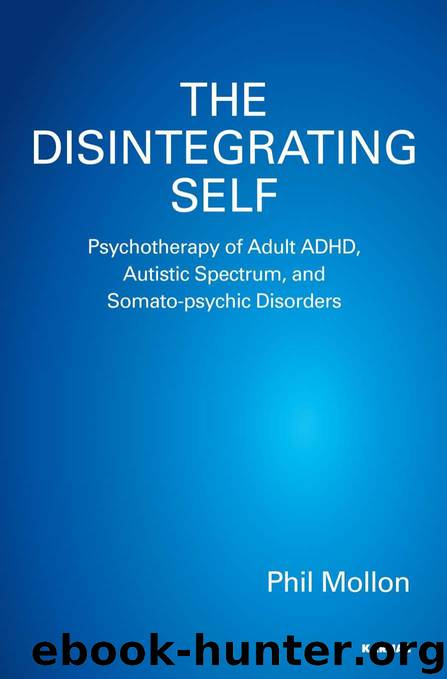The Disintegrating Self: Psychotherapy of Adult ADHD, Autistic Spectrum, and Somato-Psychic Disorders by Phil Mollon

Author:Phil Mollon
Language: eng
Format: mobi
Publisher: Karnac Books
Published: 2015-04-23T21:00:00+00:00
MOLLON Book_Mollon correx 31/03/2015 12:28 Page 171
CHAPTER EIGHT
The psychology and neurobiology
of the autistic spectrum
“The autistic child and the autistic part in all of us hanker after certainty, after freedom from doubt, after complete knowledge, after unalloyed satisfaction. The hard fact that this is unobtain-able is the sharp rock upon which . . . psychic development has foundered. Their emotional and cognitive development has been crippled by the umbrage aroused by it”
(Tustin, 1986, p. 168)
The usual description of autistic spectrum disorders as characterised by deficits in social and communication skills, and in the display of repetitive and stereotyped behaviours, may be supplemented by reference to a number of other aspects of behaviour and experience that become apparent when such people are seen in psychotherapy.
High levels of anxiety and shame
Many (but not all) people on this spectrum are assailed by continual high levels of anxiety. This may worsen when in situations involving 171
MOLLON Book_Mollon correx 31/03/2015 12:28 Page 172
172
THE DISINTEGRATING SELF
proximity to other people and particularly those requiring interaction with others. Psychological contact with other people, including eye contact, may be overstimulating, causing physiological arousal, confusion, irritation, and panic. This may be described as extreme shyness and social anxiety. It might become suffused with shame.
Some of the higher functioning people on the autistic spectrum might manage to conceal this inner turmoil and present outwardly and superficially an “apparently normal” social persona. This split between the inner cauldron of anxiety, confusion, and shame and the outer “apparently normal” personality might begin early. I once asked an extremely troubled lady, with marked autistic spectrum features and intense anxiety and shame, whether she had felt this way as a child. She replied that inwardly she had felt like this for as long as she could remember. I then asked how her teachers might have described her. She said they would have described her as a happy, outgoing, and confident child. Because the world is experienced by the person on the autistic spectrum as inherently assaultive and traumatising, the ground is laid for the development of dissociative disorders (as described in Donna William’s autobiographical book Nobody Nowhere (1998a)).
It is not only the social world that can seem frightening. People on the autistic spectrum often feel generally unsafe in the physical world. It can seem too big and too open. There can be a preference for familiar enclosed spaces. One woman managed to take the step of purchasing a house, much larger than the small flat where she had lived for some years. She found it “too big” with “too much space”, and preferred to sit in a corner with furniture surrounding her. On the other hand, claustrophobic anxiety can occur in unfamiliar enclosed spaces, such as a lift, or a new car.
The continual anxiety and physiological arousal (albeit sometimes hidden from others) tends to take its toll on the body, resulting eventually in psychosomatic illness of various kinds, particularly gut problems, headaches and migraines, and fibromyalgia.
Need for routine, predictability, and certainty Changes in routine, for example
Download
This site does not store any files on its server. We only index and link to content provided by other sites. Please contact the content providers to delete copyright contents if any and email us, we'll remove relevant links or contents immediately.
Rewire Your Anxious Brain by Catherine M. Pittman(18644)
Talking to Strangers by Malcolm Gladwell(13349)
The Art of Thinking Clearly by Rolf Dobelli(10455)
Mindhunter: Inside the FBI's Elite Serial Crime Unit by John E. Douglas & Mark Olshaker(9324)
Becoming Supernatural by Dr. Joe Dispenza(8204)
Change Your Questions, Change Your Life by Marilee Adams(7760)
Nudge - Improving Decisions about Health, Wealth, and Happiness by Thaler Sunstein(7693)
The Road Less Traveled by M. Scott Peck(7594)
The Lost Art of Listening by Michael P. Nichols(7494)
Mastermind: How to Think Like Sherlock Holmes by Maria Konnikova(7323)
Enlightenment Now: The Case for Reason, Science, Humanism, and Progress by Steven Pinker(7306)
Win Bigly by Scott Adams(7184)
The Way of Zen by Alan W. Watts(6601)
Daring Greatly by Brene Brown(6504)
Big Magic: Creative Living Beyond Fear by Elizabeth Gilbert(5756)
Grit by Angela Duckworth(5605)
Ego Is the Enemy by Ryan Holiday(5415)
Men In Love by Nancy Friday(5234)
The Laws of Human Nature by Robert Greene(5173)
